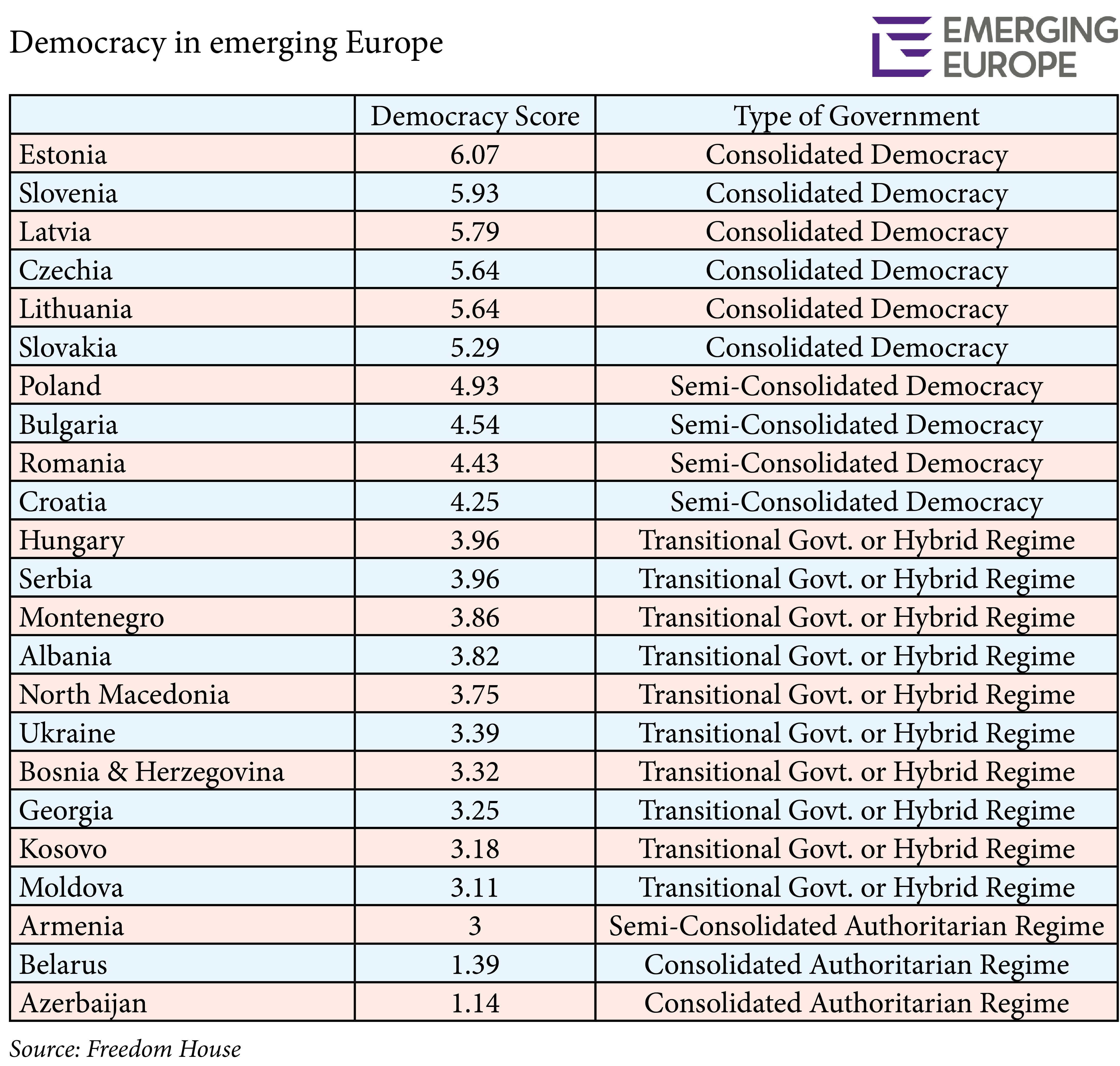A growing number of leaders in emerging Europe have dropped even the pretence of playing by the rules of democracy. They openly attack democratic institutions and are working to restrict individual freedoms, according to Nations in Transit 2020, an annual report on democratic governance in the region.
These attacks have resulted in a dramatic democratic breakdown across Central Europe, the Balkans, and Eurasia, leading to category declines for four countries in the past two years: Poland has dropped out of the consolidated democracies group and become a semi-consolidated democracy, while Hungary, Serbia, and Montenegro have all left the category of democracies entirely to become transitional/hybrid regimes.
“Many leaders in this region are no longer pretending to care about democracy or the rule of law,” says Michael J. Abramowitz, president of Freedom House. “It is time for European leaders who are committed to freedom to address the crisis in their own neighborhood. The United States also has a pivotal role to play and should rededicate itself to a foreign policy that emphasizes the defense of democratic values.”
“The coronavirus crisis has created an inflection point, after which things could become much worse, or democracy could be revitalised,” adds Abramowitz. “We hope that this experience will illustrate the importance of transparent and accountable governance and catalyze new demands for change.”
The institutions of democracy monitored by Nations in Transit are under attack across the board, and governments’ exploitation of Covid-19 may be accelerating these disturbing trends. The electoral framework has been manipulated in a way that gives undue advantage to incumbents, parliaments have become sidelined or hollowed out by opposition boycotts, and the independent media and civil society continue to face smear campaigns.
In a new development, the judiciary and the rule of law have also become targets in many countries. Governments are packing courts with loyalists, adopting restrictive laws that do away with judicial independence, and in some cases persecuting individual judges. The indicator with the largest number of declines in Nations in Transit 2020 was judicial framework and independence, with six countries deteriorating: the Czech Republic, Georgia, Latvia, Montenegro, Poland, and Slovakia.
The number of democracies is at its lowest point in the 25-year history of the report: of the 29 countries assessed, 10 were rated as democracies, 10 as hybrid regimes, and 9 as authoritarian regimes. Over the last decade, the number of hybrid regimes has more than tripled, while the number of democracies has declined by one-third.
Hungary has experienced the largest drop ever recorded in Nations in Transit, with its democracy score exceeding the average decline eightfold in the past decade. In the 2020 report, with declines related to elections, local governments, and corruption, Hungary left the group of democracies.
Poland similarly changed categories, becoming the second European Union member state to lose its consolidated democracy designation, after Hungary. The country’s losses in judicial framework and independence over the past five years have been the largest ever recorded for that indicator.
Serbia, whose scores have declined each year for five years, recently dropped into the transitional/hybrid regime category. Montenegro joined Serbia in leaving the group of democracies in the 2019 report, after hovering above the threshold for a decade. Both countries registered further declines in Nations in Transit 2020.
Positive news emerged elsewhere in the Balkans, as Kosovo and North Macedonia earned multiple score improvements. Kosovo is the only country in the report’s coverage area to secure gains in each of the last five years. Still, recent developments in both countries have cast doubt on future progress.
Armenia registered the largest two-year democracy score improvement in the report’s history, and has reached its highest-ever point for the country, with improvements related to elections and corruption in the latest edition. Developments regarding the judiciary, however, have raised concerns.
The new administration in Ukraine is facing significant challenges with structural reforms and Covid-19 in 2020. Nevertheless, the election of President Volodymyr Zelenskiy and a peaceful transfer of power from the defeated incumbent in 2019 earned the country a slight improvement in its national democratic governance score.
While Moldova’s “compromise coalition” of 2019 ultimately fell apart, the brief united front demonstrated a reduction in informal oligarchic control over the country’s institutions and led to improvements in its corruption and national democratic governance scores.
Estonia, once again, is the most democratic country in the region.
—
Unlike many news and information platforms, Emerging Europe is free to read, and always will be. There is no paywall here. We are independent, not affiliated with nor representing any political party or business organisation. We want the very best for emerging Europe, nothing more, nothing less. Your support will help us continue to spread the word about this amazing region.
You can contribute here. Thank you.





